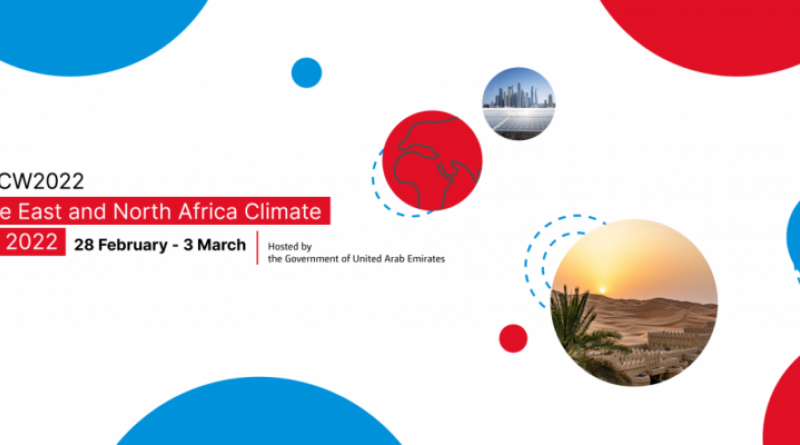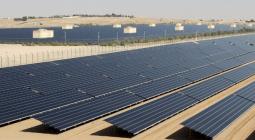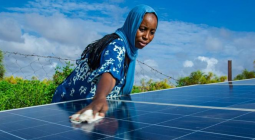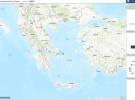MENA Climate Week 2022.

Registration Opens for MENA Climate Week 2022.
UN Climate Change News, 4 January 2022 – The first-ever Middle East and North Africa Climate Week, MENACW 2022, will be held from 28 February to 3 March 2022 at the Dubai Exhibition Centre in Dubai. This planned in-person meeting kicks off the Regional Climate Weeks in 2022 and a new era of cooperation on climate in the region. MENACW 2022 is one of the first opportunities to advance implementation of the Paris Agreement and Glasgow Climate Pact adopted at November’s COP26 in Glasgow.
Registration for MENACW 2022 is open now through February. Participants are encouraged to pre-register as early as possible by visiting the MENACW 2022 Registration website.
MENACW 2022 will build on the outcomes of last year’s COP26 UN Climate Change Conference, where regional collaboration emerged as a catalyst for global climate action. The Week will explore resilience against climate risks, the transition to a low-emission economy and collaboration to solve pressing challenges. This is an opportunity for governments, the private sector, cities, indigenous communities, youth and civil society to engage in solution-oriented dialogue, find common ground and collaborate on climate action.
Patricia Espinosa, Executive Secretary of UN Climate Change, said: “MENA Climate Week 2022 is one of our first opportunities to accelerate implementation of the Paris Agreement following COP26 in Glasgow in November. At COP26, the world took an important step forward for climate action. It is now time for us all to work together under the common set of guidelines set forth in the Glasgow Climate Pact and advance regional collaboration on reducing vulnerability, transforming global energy systems and financing a low-emission future. MENACW 2022 provides an excellent platform for these discussions, as regional collaboration is a catalyst for global progress”.
Interest is already high for this in-person event. More than 200 submissions to support MENACW 2022 and host sessions at the event were received during an Expression of Interest period in December, with high-level sessions attracting interest from dignitaries. To encourage inclusivity and enable broad collaboration, some sessions will be webcast and virtual events are anticipated.
H.E. Mariam bint Mohammed Saeed Hareb Almheiri, UAE Minister of Climate Change and Environment, said: “The Glasgow Climate Pact sounds a clear call for collaboration. It is a wake-up call to work together on green recovery from the global health crisis and a roadmap to achieve the vision of the Paris Agreement. Stakeholders from across the region are invited to join MENA Climate Week 2022 and further crucial conversations on overcoming the climate challenge and unlocking opportunity in the MENA region.”
On 2 March, MENACW 2022 will be held alongside the World Green Economy Summit (WGES), which is also hosted by the Government of the UAE. This complements MENACW 2022 discussions as the WGES aims to propel action to deliver a sustainable future. Participants who register on the MENACW 2022 Registration site will be able to attend WGES events.
H.E. Saeed Mohammed Al Tayer, Chairman of the World Green Economy Organization and Managing Director and CEO of Dubai Electricity and Water Authority, said, “With Dubai’s long-standing experience hosting regional and global events and its firm commitment to promoting a green economy, we are confident that participants from MENA countries and beyond will have a unique opportunity at MENA Climate Week 2022 in Dubai. This event will provide a platform for governments, cities, private sector leaders, financial institutions and civil society to discuss opportunities to build forward from the pandemic by identifying opportunities to enhance climate action. The event will bring together key stakeholders to take the pulse of climate action in the region, explore climate challenges and opportunities and showcase ambitious solutions. This will also facilitate high-level policy debates and technical exchanges towards strengthening institutional partnerships and regional collaboration on the green economy and climate action”.
About MENACW 2022 and the Regional Climate Weeks in 2022
MENACW 2022 is hosted by the Government of the United Arab Emirates – Ministry of Climate Change and Environment (MOCCAE), the World Green Economy Organization (WGEO) and the Dubai Electricity and Water Authority (DEWA). The event is organized in collaboration with core partners UN Climate Change, UN Development Programme, UN Environment Programme and the World Bank Group. Partners based in MENA include the International Renewable Energy Agency (IRENA), Islamic Development Bank (IsDB), the League of Arab States (LAS) Secretariat, and the UN Economic and Social Commission for Western Asia (UNESCWA).
MENACW 2022 will kick off the Regional Climate Weeks 2022, with meetings scheduled in Latin America and the Caribbean (LACCW 2022), Asia-Pacific (APCW 2022) and Africa (ACW 2022). More details on the full series of Regional Climate Weeks 2022 are coming soon.
Visit www.regionalclimateweeks.org to learn more about the Regional Climate Weeks.
MORE INFORMATION
For media inquiries, contact UN Climate Change at press@unfccc.int or John Hay at jhay@unfccc.int
For more information, visit MENACW 2022 or www.regionalclimateweeks.org
Join the conversation on social media using the hashtag #MenaClimateWeek
About the UNFCCC
With 197 Parties, the United Nations Framework Convention on Climate Change (UNFCCC) has near universal membership and is the parent treaty of the 2015 Paris Climate Change Agreement. The main aim of the Paris Agreement is to keep a global average temperature rise this century well below 2 degrees Celsius and to drive efforts to limit the temperature increase even further to 1.5 degrees Celsius above pre-industrial levels. The UNFCCC is also the parent treaty of the 1997 Kyoto Protocol. The ultimate objective of all agreements under the UNFCCC is to stabilize greenhouse gas concentrations in the atmosphere at a level that will prevent dangerous human interference with the climate system, in a time frame which allows ecosystems to adapt naturally and enables sustainable development.






